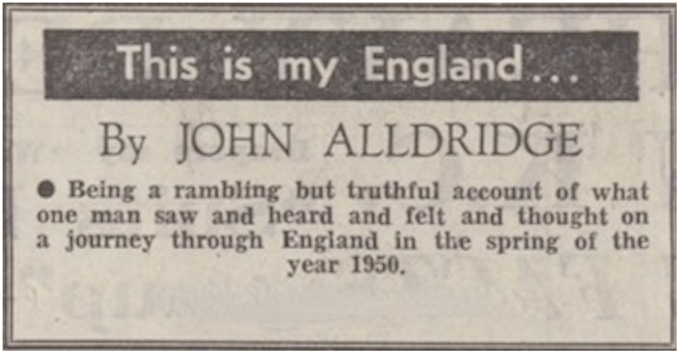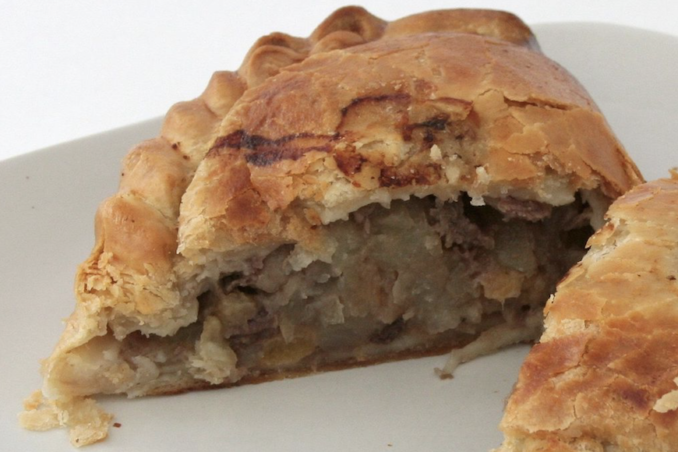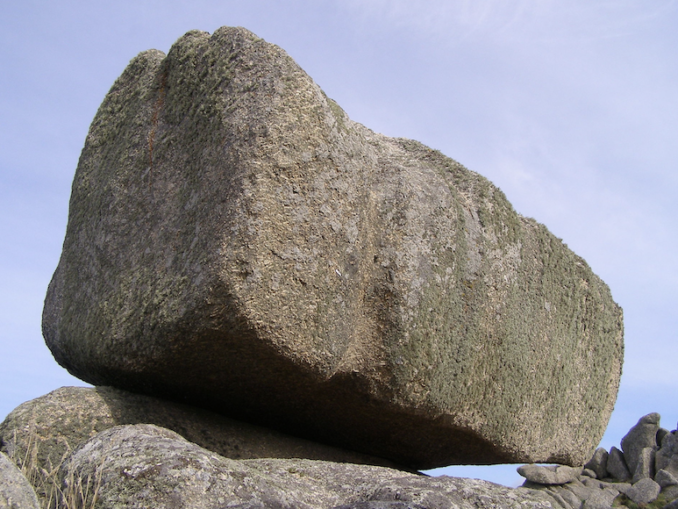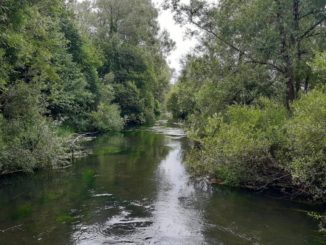
This Is My England,
© 2022 Newspapers.com
From the tip of Land’s End on a fine spring morning you may look down on a sea that can be as calm and clear as a mill pond.
From that height the Atlantic is not blue or grey but green. And by a trick of light you can see to a great depth.
Far below the surface things move sluggishly. What they are you cannot tell — a mass of drifting weed, a shoal of fish, perhaps.
But enough to quicken the imagination with thoughts of Lyonesse, that lost land which some hereabouts still insist links Cornwall to the Scillies and the Azores in one vast, drowned continent.
On mornings like this you are seeing the Cornish coast in one of its rare moods.
Then the Armed Knight, the Irish Lady, the Kettle Bottom, the Shark’s Fin, and all the rest of those savage rocks lie basking in the sun like drowsy lion cubs, their claws well hidden under the lazy surf. Gulls spiral down to rest on them just as the little Nile bird will perch on the back of a well-fed crocodile.
But the honeymoon is soon over. Come back again in October and you will hear the whole pack of them howling to be fed. You will hear them, but I doubt if you will see them, for they have a natural ally. Fog.
Sometimes in winter a fog will come rolling in from the sea and blanket the coast for as long as a week. For days at a time it will hang so thick that you will lose the hand held out in front of you.
It is almost as though a malignant spirit is in that fog. For it can play queer tricks. It will blow itself away with the coming of the sun and you will sigh with relief, thinking you have done with it.
And then, as day dies, it is back again and thicker than ever.
I have heard experienced, coast-wise skippers, who have known every rock, every cove on this savage coast since boy-hood, talk almost fearfully of these strange tricks of the fog.
How some queer attraction seems to draw a ship off a safe course into the boiling surf. How you may not hear the warning boom of the Long-ships Light until it is towering above you, though it can be clearly heard in Newlyn ten miles away.
Not for nothing was this once the favourite haunt of wreckers, land pirates who lured an unsuspecting ship on to the rocks.
And it is not much more than a hundred years ago that the first hint of fog would drive a donkey stumbling about the headland, a winking lantern tied to its tail, to beckon ships to destruction.
Nowadays a vigilant Coastguard Service keeps a day-and-night watch on this coast. And by a pleasant irony some of these coastguards are the descendants of men who made a profitable sideline out of wrecking.
We spent the better part of the morning with one of them, Dick Paul, a jolly man with a complexion of weathered mahogany, a voice like a foghorn, and a remarkable supply of racy stories.
I particularly like his version of why the people of Mousehole (he pronounces it, correctly, “Muzzle”) now eat their dumplings — huge, fragrant things, stuffed with cloves and big as cannon-balls — before their stew.
According to Dick Paul they used to swallow the stew first and then turn their attention to the main course, the dumplings. But one night in 1588 a ship of the Spanish Armada, struggling desperately home, opened fire on the town.
The Mousehole folk were just sitting down to supper and halfway through their stew when the cannonade began.
That meal broke up in panic: they took to the hills, leaving their dumplings to the famished Spaniards. Now they make a point of eating their dumplings first, just in case …
He is an authority on Cornish pasties, which, he complains bitterly, are like a good many things in Cornwall these days — not what they were.
“Why, me dear,” he’ll tell you, “I’ve seen my old mother make a pastie so big that it wouldn’t go into the oven. She cooked it turn-and-turn about. And you started eating one end of it while the other end was still cooking.”

A traditional Cornish pasty,
David Johnson – Licence CC BY-SA 3.0
Dick Paul is the coastguard at Treen, which is about three miles from Land’s End. With one other regular coastguard and one or two part-time auxiliaries, he is responsible for about five miles of the most treacherous coast in England.
They take it in turns to man a look-out post on the headland, a small wooden cabin, linked to the world by telephone now, which stands above Castle Trevene and its famous rocking stone, the Logan Rock.
It was a predecessor of his, a certain Lieutenant Goldsmith — a nephew of the poet, incidentally — who made history one uproarious night about a hundred years ago by pushing the famous rock off its pedestal.
That light-hearted prank cost the bold Lieutenant about £2,000. For my lords at the Admiralty insisted that he put it back as he found it. And £2,000 was a lot of money in 1824 — particularly to an officer of the Crown earning only £50 a year.
Dick Paul thinks he was hard done by. “Why, he was nothing more nor less than a public benefactor. They should build a monument to him right outside the Logan Rock Hotel,” he says. “Think of the beer that’s been bought there just on account of what he did!”

Close-up of the Logan Rock,
Jim Champion – Licence CC BY-SA 3.0
At this time of year a coast-guard’s job can be pretty monotonous. A lonely job, too, if you happen to be posted to one of those remote stations where you have to depend on rain for drinking water and there’s only one bus a week to Penzance.
A trawler drifting with an engine broken down, a French crabber fishing in forbidden waters, is about all the excitement you get. Though, of course, there’s always a chance that you may be called out of bed to haul up a party of trippers who have allowed themselves to get cut off by the tide.
Your real work starts in October and ends in April. Then it means standing out in a south-west gale, or staring through the fog till your eyes get red-rimmed, trying to locate a ship that’s somewhere out there bleating at you like a lost sheep.
A seventy-eight-hour week, tied to a telephone most of the time, and hoarse from arguing with obstinate skippers who are miles off their course and about a boat’s length from destruction and won’t give their names because they don’t want to be black-listed by Lloyd’s.
Soon they’ll be giving Dick Paul loudhailers and walkie-talkies to make life easier. But somehow I don’t think he is going to enjoy the job half as much then …
I should think Dick Paul is a first-class coastguard. I doubt, though, if his heart is really in his work. For Dick was born and bred a fisherman, the son and grandson of Newlyn “long-liners,” a hardy race who have dragged their miles of line with their thousands of baited hooks for ling and cod and ray since long before the Armada.
When you hear him sigh for the good old days when a Newlyn boat, “lining” for ling, or trawling for pilchard, could earn twenty pounds in a single night it’s difficult to remember that he is only 35.
Yet in his short lifetime he has seen the Cornish fishing industry decline and dwindle until what used to be the very life-blood of Cornwall has become a barely profitable sideline.
He is old enough — or young enough — to remember the great days when the keen-eyed “huers,” standing high up on the headland, would wave their beacons, cut from the nearest furze bush, to signal the approach of a swarm of pilchard.
Then every able-bodied man would be out in a boat, guiding one great sweep-net round that mass of quick-silver shimmering just below the surface.
And there would be no peace of mind until the net was drawn tight and near to breaking, and every fish was landed and the women could run home to brew strong black tea for the men on the shore.
Those were the days when Cornish pilchards were a gourmet’s delight; when the working folk of Naples and Genoa would stand in queue to buy a salted pilchard and eat it raw.
Now the taste has changed; nowadays we like our pilchards — when we like them at all — to come to us in tins, caught and packaged and labelled off San Francisco and Nagasaki.
And if a Newlyn boat, in desperation, turns to ling and mackerel it must sail far beyond the Wolf, because all the fishing grounds nearer have been dredged to the last codling by greedy trawler fleets from foreign parts, who grew rich when the country had to eat fish or die and are now off ravaging some other coast.
But we hear nothing of these things until some Cornish boat, built to fish within sight of land, is reported missing the best part of a thousand miles from home and for a day or two is headline news.
At least, that is Dick Paul’s story.
And that is why he, like many like him, are filling their idle hours growing a few violets and a few potatoes for the London market while their hearts are on the sea where they belong.
Reproduced with permission
© 2022 Newspapers.com
Jerry F 2023



